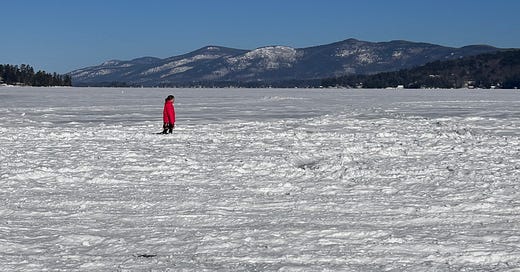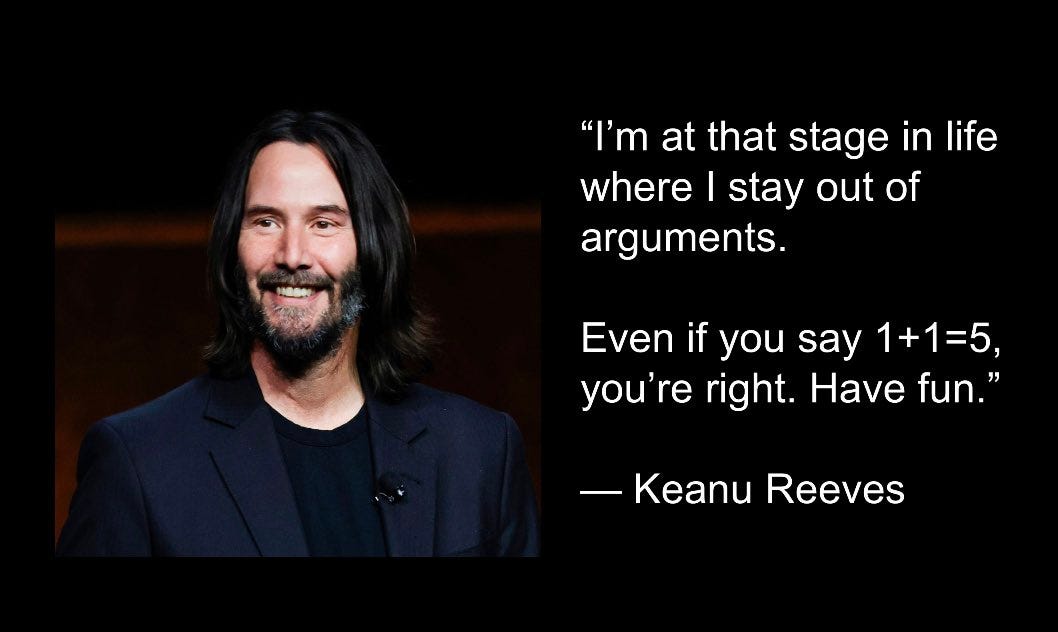Should You Start a Newsletter?
Also! ApWriMo, 2025--because we all need something to look forward to.
Hi!
It’s mid-winter break here, which, if you’re not part of the skiing class, just seems really unfair. Five days! Kids home! Below-freezing temps! What a time to be alive. Luckily my son has perfected baking the world’s best chocolate chip cookie, so all is not lost.
Besides finding various protests to pop in to, we managed to escape the city for 24 hours and head up to Lake George. My husband grew up visiting the lake each summer, and it’s just a gorgeous part of the country. I’d never seen the lake entirely frozen over before, but we walked to the very middle of it. It forces your brain to completely recalibrate how it thinks about safety and states of matter, which I found to be an interesting meditation for the week.
Why Should People Start Newsletters?
In academia, we come across all kinds of stuff that doesn’t fit nicely in a book or article. Some of that just gets saved for a new project, some of it gets woven into teaching or public talks, some of it converted into op-eds or other public-facing writing, and some of it…just stews. Maybe you want to write in a voice that feels more authentic, maybe you want to write more normatively, maybe you want to share nerdy things that you save from the cutting room floor.
My clients often ask me whether they should start newsletters. With this, as in all things, my answer is “maybe!” If this sounds stressful or dreadful, then pass. If the idea of quick, informal writing seems hard/stressful/impossible, don’t do it! Newsletters should, for most of us, take our “c-level” writing time—not trade off with writing what you need for your job. And they should be fun!
Reasons people start newsletters:
It’s fun (personal): I really think that #1 isn’t optional—if more informal, frequent, public writing doesn’t sound at least kind of fun, there are less time-consuming/ stressful ways you accomplish your goals.
There are no gatekeepers (intellectual): This is a big one. Even though I think it’s fantastic when smart academics write for public outlets, it’s hard and capricious. One client of mine just spent around 18 hours and wrote five drafts of an 800-word oped that she wrote for free. Was it worth it? Sure! The end product is great. But there’s also something to be said for having the ability to publish what you think is important, as soon as you write it, without gatekeepers.
Creates an audience for bigger projects (strategic): The idea of needing a platform to sell your book is annoying, but also you want a way to tell people about your book/podcast/business/whatever that feels organic and not like you’re selling to them. If you start a newsletter and become everyone’s favorite expert on Tibetan musical instruments, and then mention that you’re writing a book, many of your readers will want to buy that book!
Here are three potential scenarios for why you might want to start a newsletter.
Scenario 1: Octopuses are amazing
You are a marine biologist who studies the noble octopus. Despite the somewhat dry writing conventions of journals in your field, you find their majesty overwhelmingly beautiful.
The goal of the newsletter is to share the softer side of the octopus: poetry and art you create or come across, as well as reviews of octopus-related appearances in pop culture, from the novel Remarkably Bright Creatures to the documentary My Octopus Teacher.
Should you start this newsletter? Yes, 100 percent, and you should immediately send me the link so that I can have octopuses appear in my inbox on the regular.
Things to consider: To my mind, this is the ideal use of a newsletter. It’s orthogonal to your research interest, has a built-in audience, and seems like it would be relatively easy to generate content for that wouldn’t otherwise have a natural place to publish.
Real-world examples: I am hopelessly smitten by Tarot for Scholars and Noted.
Scenario 2: PeOpLe ArE WrOnG oN tHe InTeRnEt
You are a climate researcher. There is so much good research about climate. Billions of dollars have been spent on improving public-facing, climate-related science communication.
And yet, the people. On the internet. Are wrong. And you are right. And even though they haven’t learned that they are wrong yet, your newsletter is the moment they will change.
Should you start this newsletter? Alas, my friend, probably the answer is no. Because the people who are wrong will never read your newsletter. So your blood pressure will rise, the needle won’t shift, and it will take energy away from the writing you should do.
What should you do instead? I think you have two options. First, you can start a newsletter that provides people who are on your side with ammunition and framing they need to stay that way. OR you can find a way to be funny/sarcastic/ironic about it — instead of just writing about why people are wrong, subtly teaching how to identify if people are wrong.
Real-world example: I read Your Local Epidemiologist every time a new post comes out because she has, since the beginning of the pandemic, given me access to information I need to figure out what is happening around public health. She doesn’t spend time yelling at the COVID-deniers, but uses that energy to equip us with what we need to navigate the world. Today, for example, she sent out a newsletter on navigating vaccine conversations. As someone with a vested interest in my kids not getting breakthrough measles infections, this is very helpful to me!
Scenario 3: I’m writing a book! It takes so freaking long!
You are an archeologist specializing in medieval dwellings, and you are writing the book that is going to revolutionize how we understand housing from the time. The problem is, writing a book takes forever, is really lonely, and separates you from your community of similarly textile-obsessed interlocutors. You think you should start a newsletter called “The Wattle and Daub Weekly” so you can share your favorite houses as you encounter them.
Should I start this newsletter? I love this for you, and promise I will try to love medieval dwellings as much as you do (this museum has my favorite social media presence, so you can convince me!)
In all seriousness, this is a great use case for a newsletter: it gives you an outlet for your research that connects you to the people who are most likely to read your book, and it means you don’t try to package things for journals when you should be just writing your book.
Real-world example: I’m a long-time listener to #AmWriting, and I also subscribe to their newsletter. There is a paid and free version (and the paid version gets you various goodies), but the newsletter really exists to support and drive traffic to their podcast.
Okay, you sold me. What’s next?
Now that you’ve done the hard part and decided to write a newsletter, everything else is pretty straightforward. Decide who you want your audience to be, decide the cadence of posting that feels good to you, figure out a platform to host/send your newsletter, draft/ outline a month or two of posts, and then tell everyone you know that you’ve started a newsletter and ask them to subscribe. Easy peasy, right?
A few of my final thoughts about these topics:
Audience/lane/length: my sense is that more narrowly focused newsletters do better in a pretty crowded arena. That doesn’t mean you should overly specialize, but I would opt for “What School Boards Can Teach Us About Society” over “Political Science” or “An Insider’s Account of Writing a Badass Book with ADHD” over “Book Writing for the Masses.” My sense is that the sweet spot for a newsletter is around 850-1000 words on the topic (mine tend to be around there if you take out my beginning anec-rants).
Platform/money: Should you charge for the newsletter? Maybe! People should get paid for their labor, and that includes writing, and newsletters have come a way for people to get paid for their labor.
That said, charging for labor creates an audience with expectations, which makes it difficult to just write for fun or as a creative outlet. I also think it’s important to think about incentives—I don’t charge for my newsletter, because it’s fun for me, I think of it as a gift to my writing and editing community, and I hope it means that people keep me in mind when they need a workshop or an editor.
A bigger question is around platforms. As I’ve mentioned before, being on Substack means sharing a platform with Nazis and Elon Musk apologists, and that’s shitty. On the other hand, there is a vibrant, progressive ecosystem that also exists on Substack, and I’m weary about progressives being driven from the center of public digital life because of the techbroligarchy (or whatever the kids are saying these days). My sense is that there are really nice alternatives to newsletters that charge subscription fees (I know that people have been very happy with Ghost and Buttondown). If you want to neither make nor lose money, and have an archive of posts that people can scroll through, I’m not sure that host exists yet.
Newsletters from our little community:
At the risk of leaving folks out, here’s what I know of and subscribe to:
Okay, it’s a podcast not a newsletter, but check out historian Lauren Lassabe Shepherd’s American Campus Podcast (very timely!)
Obviously we all know and love Mirya Holman’s MHAWS.
Christiana Zenner’s Moments of Zenner.
Daniel Grant’s Overlooks and Understories.
If you make things, tell me about them so I can share/support them!
Alright friends, hang in there—only 7 more days of February!
Write all the things, and maybe a newsletter!
Kelly
What’s Going on Around Here
France 2025: An exciting (and fleeting!) announcement: Mirya and I are hosting a very small writing retreat in the wine country in France from July 1-6, 2025. It’s so small we didn’t even advertise it, but—we just had one spot become available. If you’re interested, email me for details. It will be magical, and give you something to dream about as you trudge through the next few months.
February lunches: Every Tuesday in February, we’ll be having lunch to talk about possibilities beyond academia. The final one is February 25 from 12-1 eastern. Sign up here, grab your lunch, and I’ll send you a link so you can join the conversation.
ApWriMo 2025! April 1-11, with a mini writing retreat April 4. You know about AcWriMo—experience our second (third?) annual ApWriMo. Write every day for 10 days, take a break, feel great about the summer starting. Register here, and I’ll send more details. Free!
So You Want to Write A Book?: Two spots left! A unique hybrid workshop dedicated to supporting writers throughout their book writing journey. Start with a new cohort in May! Enjoy discounted registration/early bird pricing through February 15. This year’s cohort just had our January meeting, and it was SO MUCH FUN! Such smart people doing cool projects. Come join us in May! More info here, Register here
Editing: I’m accepting new projects to edit in 2025! My editing calendar fills up three-to-six months in advance, so if you have something you’re hoping to get edited, this is a great time to chat about it.
You can see all of what we’re doing in 2025 here.




